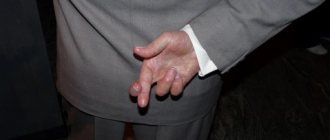Reasons for avoiding testifying
A witness is a citizen who may know information about circumstances relevant to the trial.
Note!
Criminal, administrative and civil law provides that citizens have the right to avoid testifying against close relatives, themselves and against their spouse.
The circle of close relatives is specified in Article 14 of the Family Code of the Russian Federation. According to the law, close relatives are recognized as: parents, children, grandparents, grandchildren, full and half-brothers and sisters. You can also refuse to testify in relation to adopted children and adoptive parents.
Note!
For criminal proceedings, the circle of close relatives is narrowed. According to Part 4 of Article 5 of the Criminal Procedure Code, half-siblings are excluded from the list of persons in closely related relationships.
Reasons for avoiding testifying may also be the type of activity or profession of the witness.
These reasons are not grounds for sanctions against a citizen. In other cases, evasion from giving testimony, examination, or samples entails criminal liability under Article 308 of the Criminal Code of the Russian Federation.
A witness may evade testifying and cooperating with the investigation for selfish reasons, connections with criminals, or personal interest. Refusal may delay the investigation and trial. Therefore, there is a punishment for it.
Bottom line
To summarize, if a witness or victim demonstratively refuses to testify (they make oral or written statements about their refusal to testify, thereby expressing their reluctance to assist the preliminary investigation authorities and judicial authorities, trying to help the person who committed the crime evade responsibility, then In this case, the witness or the victim may be brought to criminal liability under Article 308 of the Criminal Code of the Russian Federation.
That's all, thanks for your attention!
I ask competent lawyers to share their opinions in the comments; it will be very interesting to read your answers!
Who can refuse to testify?
According to Article 56 of the Code of Criminal Procedure, judges and juries who learn about the case as part of the trial, as well as lawyers who receive information while providing legal advice, are not called as witnesses. Paragraph 3 of this rule of law states an exception: a lawyer can testify in court with the permission of his client and in his interests.
Clergymen who learn about a crime during religious sacraments may refuse to testify. Members of the Federation Council and State Duma deputies are also exempt from witness functions if information came to them during the period of their powers. Also, information received by tax inspectors within the framework of the Law “On the voluntary declaration by individuals of assets and accounts (deposits)” is not used as evidence.
Refusal to testify as a witness
Refusal to testify in administrative proceedings is subject to a fine. In cases where a witness refuses to testify in a civil case, the citizen bears responsibility under the criminal code. At the same time, the refusal of an eyewitness or victim to testify in criminal cases provides for punishment: a fine, labor and imprisonment for a period of 3 months
Note!
According to Article 25.6 of the Code of Administrative Offenses of the Russian Federation, eyewitnesses are required to come to the judicial authority when called by the court or an official.
Also, the duties of witnesses include giving truthful testimony and honest answers to questions from participants in the process. The testimony of the witness is entered into the protocol, which is checked by the citizen, and the correctness of the records is certified by a signature.
The refusal of an eyewitness to testify will be accepted by the court only in cases where the disclosure of data occurs against one’s own interests or the interests of close relatives. In all other cases, refusal to testify is subject to liability: administrative and criminal.
What can make the MA and TSN doubt the reliability of the accounting?
MA and TSN may doubt the reliability of accounting for utility resources for many reasons. For example, in situations where:
- in addition to general house metering devices, control metering devices for general house needs were also installed and the readings of the ODN differ from the volume provided by the RSO;
- the readings of individual metering devices exceed the readings of the common building control panel;
- no data on adjustments.
Adjustments are when people take their IPU readings at the wrong time, for example, once every six months. The UO calculates the standard for them for six months, and when they submit their testimony, they must recalculate. The volume of individual consumption will change over the last six months, which means that the CD on SOI, which is paid by the MA in the RNO, must be adjusted over the last six months.
It happens that requests to the RSO do not yield anything - they refuse to provide information, citing No. 98-FZ “On Trade Secrets” or No. 152-FZ “On Personal Data”.
Responsibilities of the management company in direct agreements between owners and RSO
5106611
Refusal of the defendant to testify in court
The defendant’s refusal to testify in court is a legal right of a citizen, enshrined in the Criminal Procedure Code. Also, according to the Criminal Code, refusal to testify against oneself is not punishable by either a fine or arrest. The court proceeds from Article 47 of the Criminal Procedure Code, recognizing that giving evidence to the defendant is a right, not an obligation.
If the defendant agrees to testify, according to Article 275 of the Criminal Procedure Code, the first interrogation is carried out by the lawyer and the defense participants. During the interrogation, the defendant has the opportunity to make notes, which must be presented to the court upon request. The judge is the last to interrogate, when questions have already been asked by all parties to the trial.
Note!
In criminal proceedings, when the defendants are a group of people, non-joint testimony is provided for by the defendants.
This case is possible when one of the parties to the proceeding approaches the court with a petition. In such a situation, during the testimony of one of the defendants, the remaining defendants leave the courtroom, accompanied by employees of the Federal Bailiff Service. And after their return, the judge conveys the contents of the testimony given in the absence of the defendants and gives the opportunity to ask questions to the witness.
Refusal to provide data during the preliminary investigation in court has consequences
Don't believe what the investigators say! Believing them means not respecting yourself. And I said in my heart:
“God will judge the righteous and the wicked; for there is a time for every thing, and a judgment for every thing.”
. Answer from PETROV [guru] They said correctly that if there was a defense lawyer, then the testimony will remain evidence.
If you don’t have a lawyer, you can simply refuse them in court. Any testimony must be supported by a body of evidence. Although our cops know how to concoct a case out of nothing, the prosecutors are always in the same place, and our courts always hand down charges. sentence. Answer from Nadezhda Kurysheva[guru]any.
. The law does not limit him in this. It is not clear at what stage the criminal case is at. If at the investigation stage, then your friend may come to the investigator and say that he wants to give testimony or explanations about the case.
At what stage of the investigation can one renounce previously given testimony (self-incrimination under pressure from the employee?
. Any testimony must be supported by a body of evidence.
Although our cops know how to concoct a case out of nothing, the prosecutors are always in the same place, and our courts always hand down charges. sentence.
mentioning this possibility will force the investigator to more carefully follow the order of interrogation and keep a record.
Here are some tips for the case when a witness does not want to testify and does so only because of his obligation, risking with his answers to cause damage to the legal interests of other persons: a) Having appeared for questioning, do not begin to testify until the investigator says , for what case the witness has been summoned (and, in addition, not to testify until the investigator takes a signature on liability under Articles 181 and 182 of the Criminal Code [3 and 2]). b) Do not name any names and do not give any information about persons whose names the investigator did not pronounce.
c) Do not write or sign answers and other testimony that contain names and other information about persons whose names have not yet been found in the questions written by the investigator. These are two different tips about oral and written responses.
Disclosure of evidence in court given at the preliminary investigation stage
Possible replacement of the defense attorney - in order for the new defense attorney to familiarize himself with the case materials, the proceedings may be postponed. Errors made by the court at this stage of the trial may result in the verdict being overturned. After the preparatory part of the trial, the judicial investigation begins.
The judicial investigation consists of a set of investigative actions and other procedural actions in court. Not all investigative actions can be carried out in court, which can be carried out at the PS stage. The most common interrogation is of the defendant, the victim, witnesses, experts, and specialists.
The court is not the body that carries out criminal prosecution.
Refusal to testify during the preliminary investigation
TO OBOP!
If they beat me, it was with beatings. . You can also refer to a mental disorder at the time of writing the application and undergo a forensic psychiatric examination. . But OBOP is better. )) It doesn’t happen like that, Maria. If the investigator has not confirmed the confession with other evidence, then the case has no judicial prospects.
There is such a thing as inadmissible evidence.
Article 75. Inadmissible evidence 2. They correctly said that if there was a defense lawyer, then the testimony will remain evidence.
If you don’t have a lawyer, you can simply refuse them in court.
Any testimony must be supported by a body of evidence. Although our cops know how to concoct a case out of nothing, the prosecutors are always in the same place, and our courts always hand down charges.
sentence. any. . especially if you are a suspect, accused or defendant. . Another question is what was the quality of the investigation and whether your refusal will benefit you.
I was accused by the pack Art. 33 hours 5-st. 159 part 4 of the Criminal Code of the Russian Federation; in the courtroom the victims abandoned me. They said I had nothing to do with it and apologized in the hall.
will this affect the court's decision?
Refusal of the accused to testify
The friend was detained by police officers, searched in the absence of witnesses and a bag was seized from him, in which they found 9.7 grams of a narcotic substance (mass). Charged with committing a crime under Art. 228, Part 3.
Possession and distribution of narcotic substances on a large scale is punishable by imprisonment for a term of 4 years. The interrogation was carried out in the absence of a lawyer or a defense witness; during the interrogation, a friend, either out of fear or under pressure, confessed to the distribution. Only in three cases established by Part.
Recognizing as inadmissible in court the testimony of the suspect and accused given during the preliminary investigation
The information provided by the suspect during interrogation concerns the substance of the suspicions that have arisen about him. To do this, before the start of the interrogation, the essence of these suspicions and the rights granted to the suspect by law are explained to him (Part.
4 tbsp. 46 of the Code of Criminal Procedure of the Russian Federation). Violation of the requirements of any of the named articles of the Code of Criminal Procedure of the Russian Federation during the interrogation of a suspect entails the recognition of such evidence as inadmissible. A similar rule applies to the accused’s admission of guilt.
An admission of guilt can be used as the basis for an accusation only if its guilt is confirmed by the totality of available evidence, i.e.
information about the place, time, method of committing the crime and other elements of the subject of proof (part 1 of article 73 of the Code of Criminal Procedure of the Russian Federation). In accordance with Art.
75 of the Code of Criminal Procedure of the Russian Federation, the testimony of a suspect, given by him in the absence of a defense lawyer, not confirmed during the trial by the suspect or accused is unacceptable evidence. 2) The refusal of the suspect (accuser) to have a lawyer is not necessary for the investigator => the investigator has the right to involve a lawyer in the case.
in investigative actions at any time. The decree provisions were introduced into the Code of Criminal Procedure of the Russian Federation in 2003.
Is it possible to refuse testimony in court?
An acquaintance is accused of stealing a phone.
Can he not testify at the court hearing if he has already given it twice during the preliminary investigation? Are there negative consequences for refusing to testify? Your friend has the right not to testify against himself.
Article 51 of the Constitution of the Russian Federation contains a provision according to which no one is obliged to testify against himself, his spouse and close relatives, whose circle is determined by federal law.
In addition to spouses, close relatives of clause 4 of article 5 of the Criminal Procedure Code of the Russian Federation include parents, children, adoptive parents, adopted children, siblings, grandparents and grandchildren. The right of the accused to refuse testimony is also provided for in clause 3, part 4, article 47 of the Code of Criminal Procedure of the Russian Federation.
Refusal to testify does not entail any negative consequences for the accused. If your acquaintance exercises this right at a court hearing, his testimony that he gave during the preliminary investigation will be read out.
If desired, he can supplement his testimony.
SIDOROV ANATOLY STANISLAVOVICH, 625007,
Source: https://credit-helper.ru/otkaz-ot-poeazanij-dannyh-na-predvaritelnom-sledstvii-v-sude-chem-grozit-25741/
Refusal of the victim to testify
Responsibility for the refusal of the victim to testify is provided for in Article 308 of the Criminal Code.
The prosecutor's office of the Nenets Autonomous Okrug gives the following explanations about the victim's refusal: “the reference to the need to maintain commercial, medical and other types of secrets does not relieve persons from criminal liability.” At the same time, refusal to testify with reference to state secrets is also not grounds for non-testification.
In 2021, the Constitutional Court issued a ruling in the case of verifying the constitutionality of Articles 21 and 211 of the Law of the Russian Federation “On State Secrets” in connection with the complaint of citizen E. Yu. Gorovenko. In it, the Constitutional Court clarifies that the parties to the proceeding cannot be limited in their ability to familiarize themselves with case materials containing state secrets, and also announced the possibility of holding closed meetings and warning the participants in the trial about the non-disclosure of information containing secret data outside the framework of the trial.
Note!
Responsibility will follow if the victim refuses to undergo a judicial examination.
To establish the nature and degree of harm caused to health, mental and physical condition, as well as age, the consent of the victim is not required.
Why did such a question arise?
In case of direct contracts, the management company or TSN are not the providers of utility services for consumers; the provision of utility services is carried out directly by the RSO on the basis of direct contracts with the owners of the premises.
At the same time, the MA or TSN under direct contracts are responsible for paying for the utility resource consumed for the maintenance and use of common property in an apartment building.
The volume of utility resources to be paid by the management authority or TSN is determined by the formula prescribed in paragraph 21.1 of the Russian Government Resolution No. 124 dated February 14, 2012.
The volume to be paid by the UO or TSN is the difference between the readings of the common house meter and the total volume of the utility resource paid by consumers.
At the same time, with direct contracts, management organizations and TSN do not have the opportunity to verify the accuracy of the data provided by the RSO about how much utility resources residents of apartment buildings actually consume. The UO and TSN also do not have the right to independently take readings from the IPU in accordance with the Rules for the Provision of Public Utilities, since they are not providers of public services.
It turns out that RSO carries out calculations of the volume of supplied utility resources independently unilaterally and does not confirm this with documents.
Ministry of Construction of the Russian Federation on concluding direct contracts in houses with ITP
405924
What happens after you refuse to testify?
According to Article 308 of the Criminal Code of Russia, refusal by an eyewitness to testify or refusal to undergo an examination by a victim is an unlawful act for which criminal liability is provided.
Note!
The maximum penalty imposed on an eyewitness who refuses to testify is arrest for up to three months.
But the court can choose another punishment option: no more than 360 hours of compulsory labor, a fine of up to 40 thousand rubles, or correctional labor for a year.
Article 51 of the Code of Administrative Proceedings provides for a fine of up to 5 thousand rubles if a witness fails to appear in court without a good reason. The court also has the right to force the attendance of a witness if necessary.
If during the investigation an eyewitness to a crime changes his mind and decides to testify at trial, this will not be a fact that mitigates liability for the initial refusal.
On the contrary, the testimony of witnesses obtained during the preliminary investigation, but not confirmed in court under oath, will not be taken into account by the judge.




